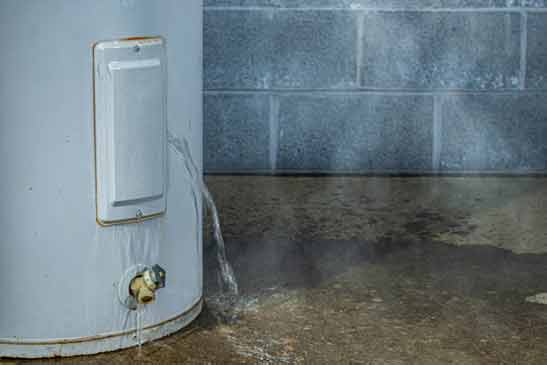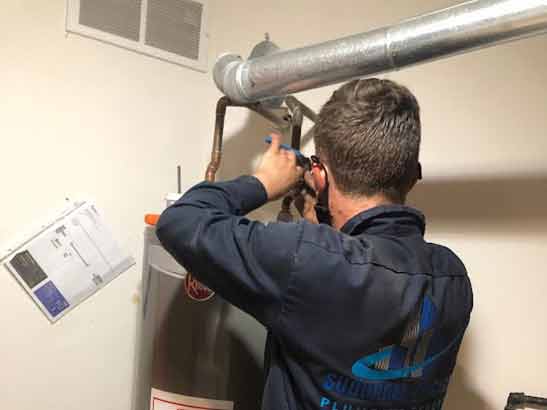
Having a hot water heater is essential for a comfortable and convenient lifestyle. It allows us to enjoy warm showers and clean dishes effectively. However, when your hot water heater breaks down, it can be a major inconvenience. Not only does it disrupt your daily routines, but it also leaves you without access to hot water.
Below we will explore the necessary steps to take when your hot water heater breaks down. By following these guidelines, you can minimize the inconvenience and get your hot water supply restored quickly.
Assess the Situation
When you discover that your hot water heater is not functioning properly, the first thing to do is to assess the situation. Try to identify the specific problem, which will help you determine the appropriate course of action. Common issues with hot water heaters include:
- No hot water
- Inadequate hot water supply
- Strange noises
- Leaking
- Pilot light not staying on
Understanding the problem will give you a clearer idea of whether it is something you can fix yourself or if professional assistance is required.
Troubleshoot the Problem
Depending on the issue you have identified, there are various troubleshooting steps you can take to potentially resolve the problem on your own:
No Hot Water
If there is no hot water at all, the first thing to check is the power supply. Ensure that the circuit breaker for the hot water heater is switched on. If it is already on, try resetting the breaker by turning it off and then back on again. Additionally, check if the pilot light is lit. If not, you may need to relight it following the manufacturer’s instructions.
Inadequate Hot Water Supply
If you are not getting enough hot water, the thermostat settings might be incorrect. Check the thermostat on the hot water heater and adjust it to a higher temperature if necessary. However, be cautious not to set it too high, as it can be a safety hazard.
Another potential cause for inadequate hot water supply is sediment buildup in the tank. Over time, minerals and debris can accumulate, reducing the efficiency of your hot water heater. Consider flushing the tank to remove any sediment. Refer to the manufacturer’s instructions or seek professional guidance if needed.
Strange Noises
If your hot water heater is making unusual noises, such as popping or cracking sounds, it could be an indication of mineral buildup or a broken heating element. Flushing the tank may help resolve the issue if it is due to sediment. However, if the noises persist, it is advisable to contact a professional plumber to inspect and repair or fully replace your water heater.
Leaking
A leaking hot water heater requires immediate attention as it can lead to water damage and higher utility bills. First, turn off the power supply to the hot water heater and shut off the water supply valve. Place a bucket under the leak to collect any dripping water. To prevent further damage and potential flooding, contact a professional plumber to assess the situation and repair the leak.
Pilot Light Not Staying On
If the pilot light on your hot water heater keeps going out, it may be due to a faulty thermocouple. The thermocouple is a safety device that detects if the pilot light is functioning correctly. If it is not, the gas supply to the burner will be shut off. In this case, it is recommended to consult a professional technician who can replace the thermocouple for you.

Professional plumbers and technicians have the expertise, tools, and knowledge to diagnose and repair complex problems with hot water heaters.
Seek Professional Help
While troubleshooting the problem yourself can be effective for minor issues, there are situations where professional assistance is necessary. If you encounter any of the following scenarios, it is advisable to contact a licensed plumber or technician:
- Gas leaks or smell of gas
- Major leaks or flooding
- Electrical issues or malfunctions
- Problems with the gas burner or heating element
- Faulty or damaged components
Professional plumbers and technicians have the expertise, tools, and knowledge to diagnose and repair complex problems with hot water heaters. They can ensure that the repair is performed safely and effectively, restoring your hot water supply in no time.
Consider Repair or Replacement
After assessing the situation and determining the cause of the problem, you need to consider whether to repair or replace your hot water heater. Factors to consider include:
- The age of your hot water heater
- The extent of the damage or malfunction
- The cost of repair compared to the cost of a new unit
- The energy efficiency of your current hot water heater
If your hot water heater is relatively new and the issue is minor, repairing it may be the most cost-effective choice. However, if the unit is old, experiencing frequent breakdowns, or has major issues, it may be more economical in the long run to replace it with a newer, more energy-efficient model.
Preventative Maintenance
Regular maintenance can help prolong the lifespan of your hot water heater and prevent unexpected breakdowns. Some essential maintenance tasks include:
- Flushing the tank to remove sediment buildup
- Inspecting and replacing the anode rod as needed
- Testing the pressure relief valve
- Checking and adjusting the thermostat settings
- Removing debris from around the hot water heater
Furthermore, scheduling annual professional maintenance can ensure that your hot water heater is in optimal condition. A professional plumber nearby can inspect the unit, identify any potential issues, and perform necessary repairs or adjustments.
In Conclusion
Dealing with a broken hot water heater can be inconvenient, but by following the steps outlined in this article, you can minimize the disruption and quickly restore your hot water supply. Remember to assess the situation, troubleshoot the problem if possible, seek help from a local plumber when needed, and consider repair or replacement options. Additionally, practicing preventative maintenance can reduce the likelihood of future breakdowns and extend the lifespan of your hot water heater. By taking proactive measures and addressing issues promptly, you can ensure a reliable hot water supply for your household.